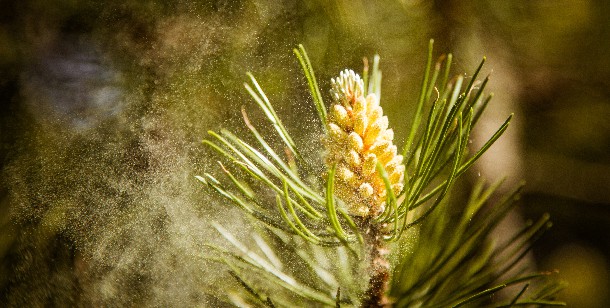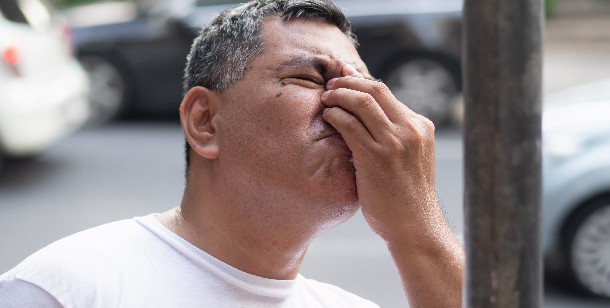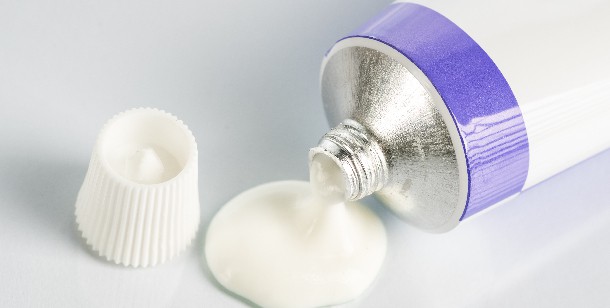If you suffer from frequent nosebleeds and allergies, you’re probably wondering if the two are related. Do allergies make your nose bleed? The simple answer is yes; allergies can be a common cause of nosebleeds.
Our noses are filled with tiny blood vessels that can be easily irritated or damaged. Nosebleeds happen when our nasal membranes dry out and those small blood vessels are opened up. Dry nasal passages are a common result of an allergic reaction. If you suffer from allergies, the occasional nosebleed is nothing to worry about.

What Kind of Allergies Cause Nosebleeds?
Most allergies related to the respiratory system can cause nosebleeds. Breathable allergens include things like:
- Pollen
- Dust Mites
- Mold
- Cockroach Waste
- Animal Dander
As you take in allergens through your nasal cavity, your immune system kicks into overdrive, causing your sinuses to swell and an increase in mucus production. This makes it difficult to breathe and will prompt you to blow your nose. Aggressive or excessive nose blowing in response to feeling congestion ends up drying out your nose and causing the irritation that can eventually lead to a nosebleed.

Other Causes of Nosebleeds
When answering the question of do allergies make your nose bleed, there are other potential causes which includes the following:
Thin or Dry Air & High Altitudes
Air present at high altitudes is often thin and dry. Prolonged exposure can cause your nose to dry out and irritate the blood vessels, resulting in bleeding.
Excessive Nose Blowing or Picking
As previously stated, excessive nose blowing as a result of congestion caused by a cold, flu, or sinus infection can lead to irritation of the blood vessels in the nose. Additionally, excessive picking at the debris or crust accumulated in the nasal passages can cause lacerations to the nasal membrane, leading to nosebleeds.
Injuries
Acute facial or nasal trauma, such as a broken nose, can cause nosebleeds. While nosebleeds are normally no reason for alarm, bleeding caused by trauma should be treated by a medical care professional as soon as possible.
Certain Medications
Nosebleeds can sometimes be a side effect of medication. Blood thinners specifically, can cause a person to be more susceptible to nosebleeds.

How Do You Stop A Nosebleed From Allergies?
Whether or not they are caused by allergies, most nosebleeds can be stopped in a similar way. Stop a nosebleed by doing the following:
- Get tissues or a clean towel to catch the blood flowing from the nose.
- Sit up or stand. It is important that you are not reclining in any way, as this decreases your risk of choking.
- Tilt your head forward, not backwards, and pinch the bridge of your nose. Breathe through your mouth. Apply pressure for 10 minutes and be sure to maintain pressure when checking to see if the nosebleed has stopped.
During a nosebleed, DO NOT blow your nose. This will further irritate your nasal passages and encourage bleeding. DO NOT tilt your head backwards, as this increases your chances of swallowing blood, which may cause you to begin coughing, choking, or vomiting.
If your nosebleed lasts longer than10 minutes, you may be able to use a nasal spray to help constrict blood vessels. Follow the directions to administer treatment and continue to apply pressure. If the duration of your nosebleed exceeds 20 minutes, and the bleeding shows no sign of stopping, contact your doctor or a medical professional for immediate assistance.

Preventing Nosebleeds
To prevent nosebleeds, avoid causing excess irritation to the blood vessels in your nose. You can do this by preventing your nose membranes from drying out. A simple way to do this is by applying a thin layer of petroleum jelly or antibiotic ointment to the inside of your nostrils, particularly around the nasal septum.
What To Do About Recurring Nosebleeds
If you are experiencing nosebleeds more than once a week, your nosebleeds can be described as frequent and recurring. This could be a sign of something more serious than allergies, and it is a good idea to schedule an appointment with your doctor. Your physician may recommend allergy testing or additional tests to help determine the underlying cause of the frequent bleeding.
Village Emergency Centers Handles Nosebleeds
So, do allergies make your nose bleed? Yes, they can. Is this a reason for alarm? Not in most cases. To get help with a nosebleed lasting longer than 20 minutes, head to a clinic near you.

